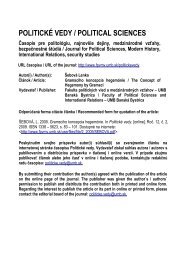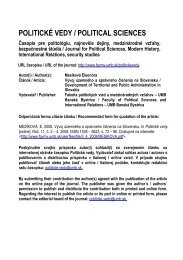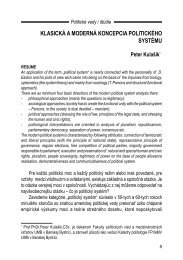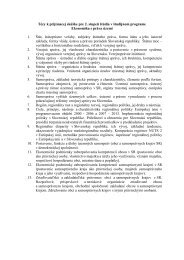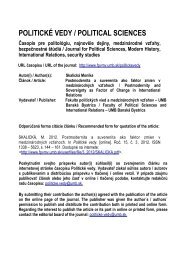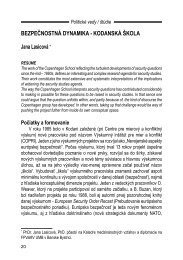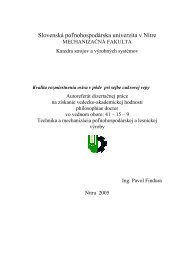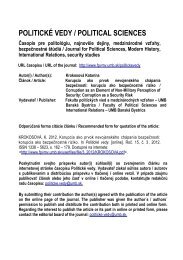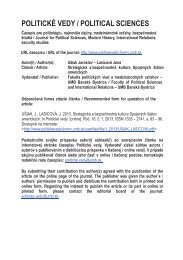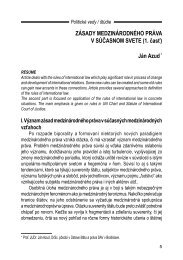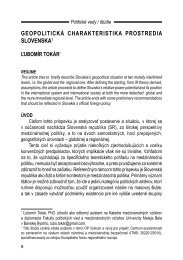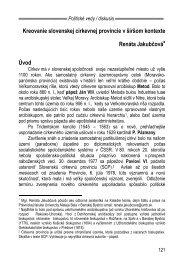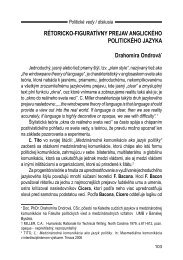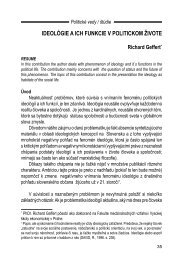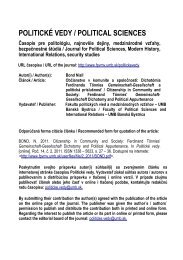MRAVNÃ VÃCHOVA V Å KOLÃCH NA SLOVENSKU A V ZAHRANI ÄÃ
MRAVNÃ VÃCHOVA V Å KOLÃCH NA SLOVENSKU A V ZAHRANI ÄÃ
MRAVNÃ VÃCHOVA V Å KOLÃCH NA SLOVENSKU A V ZAHRANI ÄÃ
Create successful ePaper yourself
Turn your PDF publications into a flip-book with our unique Google optimized e-Paper software.
etc. Prevailing frontal (traditional) education does not develop pupils´ abilities to differentiate<br />
(distinguish socially) various attitudes and characteristics in their schoolmates´ expression more<br />
precisely. A coherent supervision of pupils in the development of differentiating abilities and skills in<br />
various social situations is a long term debt of our schools that cannot be changed easily.<br />
Moral education – problem of the contemporary Czech school<br />
First of all, it is necessary to emphasize that on the basis of the Framework Education Programme<br />
(FEP) all primary schools in the Czech Republic have created their own School Education<br />
Programmes (SEPs). Secondary schools have been creating the same gradually. FEPs for primary<br />
schools (2005) and for secondary schools (2007) are documents that provide space for schools to<br />
profile themselves relatively autonomously. They can merge subjects, create new subjects, transform<br />
curriculum contents into projects, teach in blocks, use their own methods of assessment etc. In this<br />
curricular document, to more extent than in any previous documents, emphasis is put on the so-called<br />
key competencies. Attention is also paid to new topics within the so-called educational areas (e. g.<br />
Man and World, Man and Society, Man and Health etc.). All this is achieved through the contents and<br />
orientation of the so-called cross-curricular subjects. In terms of primary schools there are six crosscurricular<br />
subjects (Moral, Character and Social Education, Civic Education for Democracy,<br />
Education towards Thinking in European and Global Contexts, Multicultural Education,<br />
Environmental Education and Media Education). In terms of FEP for grammar schools there are five<br />
cross-curricular subjects with the same names (except for the Civic Education for Democracy).<br />
Including of the cross-curricular subjects into SEPs enables schools to deal with issues that used to be<br />
on the margin of the teachers´ attention. It is problematic, however, to which extent teachers are<br />
professionally and didactically capable of dealing with those topics (e.g. none of them could study<br />
Media Education at university). Most of the time teachers can only rely on individual studies, although<br />
there are not always good quality information sources available.<br />
Ethical and also value problems can be found in the educational areas as well as in the contents of the<br />
cross-section subjects. Within Moral, Character and Social Education one of the topics is Moral<br />
development, which is divided into two subtopics: Problem-solving and decision-making skills and<br />
Values, attitudes, practical ethics (s.76). In general, ethical topics within FEPs are scattered and the<br />
document does not offer any concept of systematic formation of pupils´ character (morality) from preschools<br />
to secondary schools. The topics appear episodically and they are usually mentioned as minor<br />
in terms of other issues. It is so-called “mingling with all subjects” – i.e. maybe everywhere, maybe<br />
nowhere. So, it is impossible to speak about any systematic, conceptual and coherent moral influence<br />
that would be supported in this basic curricular document.<br />
After all, ethics is not a study area at any faculty of education in the Czech Republic and thus it is<br />
logical that it is not stated as a subject in FEPs (Except for traditional subjects teachers can study e.g.<br />
Health Education at universities).<br />
Mostly due to the increase in pupils´ educational and discipline problems (aggression, bullying,<br />
alcohol, drugs but also “new” sociopathic phenomena, such as deliberate self-harm, netolism and<br />
cyber-bullying, of which also teachers become victims) there are more calls for precautions and<br />
methods that would solve the above stated phenomena.<br />
There are two kinds of suggested and discussed precautions: restrictive and preventive. Unfortunately,<br />
teachers tend to prefer the restrictive precautions in form of stricter punishments, more power to<br />
teachers (status of public servants), installation of security cameras and frames, security patrols in<br />
schools etc. The reason why the restrictive attitude is preferred is the fact that majority of teachers<br />
lacks authentic and tried ways of influencing moral character of their pupils (Vacek, Švarcová, 2008).<br />
At the moment, discussion is held on the website of the Pedagogical Research Institute authorized by<br />
the Czech Ministry of Education, Youth and Sports whether ethics should be included into the FEP for<br />
primary schools as a Complementary educational field (subject). Second foreign language and Drama<br />
303



